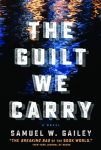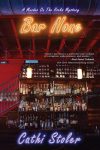

January 14 – 20: “What is the primary job of a thriller?”
 Entertainment? Escapism? To provoke thought? This week ITW Members Jess Montgomery, Larry Loftis, L. A. Starks, Peter James, William L. Myers, Jr., Cathi Stoler, Samuel W. Gailey, Uri Norwich and Martin Roy Hill will discuss the question: What is the primary job of a thriller? Scroll down to the “comments” section to follow along – you won’t want to miss this!
Entertainment? Escapism? To provoke thought? This week ITW Members Jess Montgomery, Larry Loftis, L. A. Starks, Peter James, William L. Myers, Jr., Cathi Stoler, Samuel W. Gailey, Uri Norwich and Martin Roy Hill will discuss the question: What is the primary job of a thriller? Scroll down to the “comments” section to follow along – you won’t want to miss this!
 Jess Montgomery is the author of the Kinship Historical Mystery series, inspired by Ohio’s true first female sheriff and published by Minotaur Books. THE WIDOWS, the first book in the series, is set in 1920s Appalachia and follows two women who investigate murder and fight for their community. Jess is also a newspaper columnist, focusing on the literary life, authors and events of her native Dayton, Ohio for the Dayton Daily News.
Jess Montgomery is the author of the Kinship Historical Mystery series, inspired by Ohio’s true first female sheriff and published by Minotaur Books. THE WIDOWS, the first book in the series, is set in 1920s Appalachia and follows two women who investigate murder and fight for their community. Jess is also a newspaper columnist, focusing on the literary life, authors and events of her native Dayton, Ohio for the Dayton Daily News.
 Larry Loftis is the international bestselling author of the nonfiction spy thriller, INTO THE LION’S MOUTH: The True Story of Dusko Popov — World War II Spy, Patriot, and the True Life Inspiration for James Bond.
Larry Loftis is the international bestselling author of the nonfiction spy thriller, INTO THE LION’S MOUTH: The True Story of Dusko Popov — World War II Spy, Patriot, and the True Life Inspiration for James Bond.
 William L. Myers, Jr. is the No. 6 bestselling author for Amazon Kindle in 2017 for his debut. Once you pick up his legal thriller and bestselling novel, A Criminal Defense, it becomes obvious he is not new to the intricacies of the legal profession. Open A Criminal Defense and you’ll find yourself lost in a labyrinth of deceits and hidden agendas, a world where everyone has a secret. You never know what is going to happen next or when the plot is going to take another unexpected turn.
William L. Myers, Jr. is the No. 6 bestselling author for Amazon Kindle in 2017 for his debut. Once you pick up his legal thriller and bestselling novel, A Criminal Defense, it becomes obvious he is not new to the intricacies of the legal profession. Open A Criminal Defense and you’ll find yourself lost in a labyrinth of deceits and hidden agendas, a world where everyone has a secret. You never know what is going to happen next or when the plot is going to take another unexpected turn.
 Samuel Gailey was raised in a small town in northeast Pennsylvania (population 379) and now resides on Orcas Island with his wife, author Ayn Gailey, and daughter. The Guilt We Carry is his second novel, following the critically acclaimed Deep Winter (Penguin). Gailey’s novels are intriguing studies of human nature and portray how the simplest act of fate can alter and shatter lives. Before writing novels, he wrote and developed shows for Showtime and Fox.
Samuel Gailey was raised in a small town in northeast Pennsylvania (population 379) and now resides on Orcas Island with his wife, author Ayn Gailey, and daughter. The Guilt We Carry is his second novel, following the critically acclaimed Deep Winter (Penguin). Gailey’s novels are intriguing studies of human nature and portray how the simplest act of fate can alter and shatter lives. Before writing novels, he wrote and developed shows for Showtime and Fox.
 L. A. Starks is the author of the three-book Lynn Dayton thriller series and an energy investor. 13 Days: The Pythagoras Conspiracy, first in the series, received 5-star ratings. Strike Price, the second, is also well-ranked by reviewers and won the Texas Association of Authors’ First Place Award for best mystery/thriller. Just-published THE SECOND LAW is the third book in the series. Starks is also multi-published in short stories and nonfiction. She was born in Boston, Massachusetts. She grew up in Oklahoma, earned a B.S. in chemical engineering from Tulane University in New Orleans and an MBA in finance from the University of Chicago’s Booth School of Business, and now lives in Texas. Prior to her investment focus she worked in the energy business directly in engineering, finance, and marketing. Her favorite recent international destinations include Denmark, Spain, and Switzerland. She has run fourteen half-marathons.
L. A. Starks is the author of the three-book Lynn Dayton thriller series and an energy investor. 13 Days: The Pythagoras Conspiracy, first in the series, received 5-star ratings. Strike Price, the second, is also well-ranked by reviewers and won the Texas Association of Authors’ First Place Award for best mystery/thriller. Just-published THE SECOND LAW is the third book in the series. Starks is also multi-published in short stories and nonfiction. She was born in Boston, Massachusetts. She grew up in Oklahoma, earned a B.S. in chemical engineering from Tulane University in New Orleans and an MBA in finance from the University of Chicago’s Booth School of Business, and now lives in Texas. Prior to her investment focus she worked in the energy business directly in engineering, finance, and marketing. Her favorite recent international destinations include Denmark, Spain, and Switzerland. She has run fourteen half-marathons.
 Peter James is a U.K. No. 1 bestselling author, best known for writing crime and thriller novels, and the creator of the much-loved Detective Superintendent Roy Grace. With a total of 13 Sunday Times No. 1s under his belt, he has achieved global book sales of over 19 million copies to date, and has been translated into 37 languages. Synonymous with plot-twisting page-turners, Peter has garnered an army of loyal fans throughout his storytelling career – which also included stints writing for TV and producing films. He has won over 40 awards for his work, including the WHSmith Best Crime Author of All Time Award, Crime Writers’ Association Diamond Dagger and a BAFTA nomination for The Merchant of Venice starring Al Pacino and Jeremy Irons, for which he was an executive producer. Many of Peter’s novels have been adapted for film, TV and stage.
Peter James is a U.K. No. 1 bestselling author, best known for writing crime and thriller novels, and the creator of the much-loved Detective Superintendent Roy Grace. With a total of 13 Sunday Times No. 1s under his belt, he has achieved global book sales of over 19 million copies to date, and has been translated into 37 languages. Synonymous with plot-twisting page-turners, Peter has garnered an army of loyal fans throughout his storytelling career – which also included stints writing for TV and producing films. He has won over 40 awards for his work, including the WHSmith Best Crime Author of All Time Award, Crime Writers’ Association Diamond Dagger and a BAFTA nomination for The Merchant of Venice starring Al Pacino and Jeremy Irons, for which he was an executive producer. Many of Peter’s novels have been adapted for film, TV and stage.
 Cathi Stoler is an award-winning author. Her new Urban Thriller, BAR NONE, A Murder on the Rocks Mystery, featuring The Corner Lounge bar owner, Jude Dillane, will be published this October by Clay Stafford Books. A new series, with Blackjack player Nick Donahue, it includes the novel Out of Time and the novella Nick of Time. Both will be published next year by Black Opal Books. She is also the author of the three volume Laurel & Helen New York Mystery series, which includes Telling Lies, Keeping Secrets and The Hard Way, and a three-time finalist and winner of the 2015 Derringer for Best Short Story, “The Kaluki Kings of Queens”. Very involved in the crime writing world, Cathi serves as Co-Vice President of Sisters in Crime New York/Tri-State, and is a member of Mystery Writers of America and International Thriller Writers.
Cathi Stoler is an award-winning author. Her new Urban Thriller, BAR NONE, A Murder on the Rocks Mystery, featuring The Corner Lounge bar owner, Jude Dillane, will be published this October by Clay Stafford Books. A new series, with Blackjack player Nick Donahue, it includes the novel Out of Time and the novella Nick of Time. Both will be published next year by Black Opal Books. She is also the author of the three volume Laurel & Helen New York Mystery series, which includes Telling Lies, Keeping Secrets and The Hard Way, and a three-time finalist and winner of the 2015 Derringer for Best Short Story, “The Kaluki Kings of Queens”. Very involved in the crime writing world, Cathi serves as Co-Vice President of Sisters in Crime New York/Tri-State, and is a member of Mystery Writers of America and International Thriller Writers.
 Before starting to write his novels, Uri Norwich attained his knowledge in various fields of expertise. His formal education consists of a Master of Science degree in Engineering and MBA in Economics, leading eventually to the career in investment and money management. Wall Street is a main backdrop where his characters operate, make illegally their profits, and put them into evil schemes to advance their goals. The author has been traveling the world extensively. His experiences reflected in his novels conveying to the reader a sense of being present at the time and place he is reading about.
Before starting to write his novels, Uri Norwich attained his knowledge in various fields of expertise. His formal education consists of a Master of Science degree in Engineering and MBA in Economics, leading eventually to the career in investment and money management. Wall Street is a main backdrop where his characters operate, make illegally their profits, and put them into evil schemes to advance their goals. The author has been traveling the world extensively. His experiences reflected in his novels conveying to the reader a sense of being present at the time and place he is reading about.
 Martin Roy Hill is the author of the Linus Schag, NCIS, thrillers, the Peter Brandt thrillers, and the award-winning short story collection DUTY, and EDEN: A Sci-Fi Novella. Martin’s short stories have appeared in Alfred Hitchcock Mystery Magazine, ALT HIST: The Journal of Historical Fiction and Alternative History, Mystery Weekly Magazine, Crimson Streets, Nebula Rift, Devolution Z, and others. His latest Linus Schag thriller, The Butcher’s Bill, was named 2017 Best Suspense Thriller by the Best Indie Books Awards, the 2017 Clue Award for Mystery and Suspense from the Chanticleer International Book Awards, 2018 First Place for Adult Fiction from the California Author Project, and the 2018 Silver Medal for Thrillers from the Readers Favorite Book Awards.
Martin Roy Hill is the author of the Linus Schag, NCIS, thrillers, the Peter Brandt thrillers, and the award-winning short story collection DUTY, and EDEN: A Sci-Fi Novella. Martin’s short stories have appeared in Alfred Hitchcock Mystery Magazine, ALT HIST: The Journal of Historical Fiction and Alternative History, Mystery Weekly Magazine, Crimson Streets, Nebula Rift, Devolution Z, and others. His latest Linus Schag thriller, The Butcher’s Bill, was named 2017 Best Suspense Thriller by the Best Indie Books Awards, the 2017 Clue Award for Mystery and Suspense from the Chanticleer International Book Awards, 2018 First Place for Adult Fiction from the California Author Project, and the 2018 Silver Medal for Thrillers from the Readers Favorite Book Awards.
- LAST GIRL MISSING with K.L. Murphy - July 25, 2024
- CHILD OF DUST with Yigal Zur - July 25, 2024
- THE RAVENWOOD CONSPIRACY with Michael Siverling - July 19, 2024
